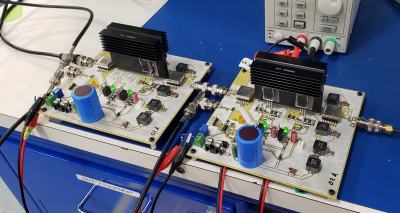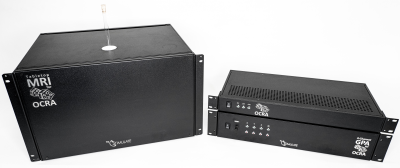Onsite Tutorial
Build Your Own Open-Source Scanner
Joint Annual Meeting ISMRM-ESMRMB & ISMRT 31st Annual Meeting • 07-12 May 2022 • London, UK

| Magnet, Shims & Gradients | |||
| 12:30 | The Magnet & Shims
Thomas O'Reilly
|
||
| 12:55 | The Gradient Coils
Sebastian Littin
|
||
| RF Coils & System Amplifiers | |||
| 13:20 | The RF Coil
Matthew Wilcox
|
||
| 13:45 |  |
The RF & Gradient Amplifiers
Mike Twieg
Most low-field MRI projects make use of off-the-shelf gradient and RF power amplifiers, but such options are often poor fits for low-field applications, especially if cost is a concern. Thus there is increasing interest in designs aimed towards low-field systems. This talk covers existing designs and projects, and discusses some of the tradeoffs between them. A new open source RFPA design, The Easy RFPA, is also presented.
|
|
| 14:10 | Break & Meet the Teachers |
||
| The Spectrometer, Pulse Programming & Phantom | |||
| 14:35 |  |
OCRA Tabletop MRI System
Marcus Prier
MRI machines are difficult to access for research and training purposes. The open-source Tabletop MRI developed by the Otto-von-Guericke University employees and students based on the idea of the Martinos Tabletop MRI and the OCRA project is inexpensive to purchase and allows teaching on state of the art MRI hard- and software. This benchtop device allows for the measurement of test-tube-sized samples with the physics of a clinical MRI machine.
|
|
| 15:00 | The Phantom
Kalina Jordanova
Evaluating the performance of MRI systems validates MR measurements. A phantom is an object used to ensure that MR systems and methods operate correctly. Phantom design requires identifying target measurements to be evaluated, and designing an object that can validate those measurements. Tradeoffs are made in phantom design to target specific properties or to accommodate different hardware configurations. Thus, physical properties of phantoms can be vastly different depending on the system and application being evaluated. This talk discusses methods to design home-built phantoms that tackle many challenges in phantom design and highlights the most important considerations for open-source designs. |
||
| Putting It All Together | |||
| 15:25 | Demo: Putting It All Together
Kristen Zarcone
|
||
| 15:50 | Live demos: Systems and Components | ||
The International Society for Magnetic Resonance in Medicine is accredited by the Accreditation Council for Continuing Medical Education to provide continuing medical education for physicians.